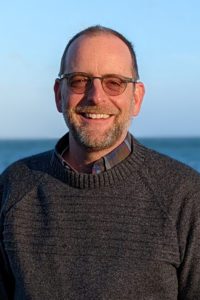WHOI scientist honored by Association for the Sciences of Limnology and Oceanography

Dr. Benjamin Van Mooy is being presented with the G. Evelyn Hutchinson Award from the Association for the Sciences of Limnology and Oceanography (ASLO). Photo by Helen Fredricks © Woods Hole Oceanographic Institution
Woods Hole, MA — Dr. Benjamin Van Mooy, Woods Hole Oceanographic senior scientist and Marine Chemistry and Geochemistry Department Chair, is being presented with the G. Evelyn Hutchinson Award from the Association for the Sciences of Limnology and Oceanography (ASLO). ASLO presents the award annually to a scientist who has made considerable contributions to knowledge in their field, and whose work will carry on a legacy in future research.
Dr. Van Mooy is being honored with this award for his fundamental insights into phosphorus and lipid cycling in marine ecosystems, through innovative experimental and observational studies employing novel analytical techniques. He will receive his award at the 2022 Ocean Sciences Meeting later this month.
“When I heard the news, I was overjoyed and deeply humbled,” said Van Mooy. “Oceanography is so collaborative; I will accept this award on behalf of everyone I’ve worked with, particularly those in my lab group at WHOI. It is a privilege to work and be a part of this community and continue researching critical aspects of ocean chemistry that will impact how ocean ecosystems respond to future change.”
“With this award comes a great deal of responsibility. The award has inspired me to rededicate myself to continuing to foster diversity and inclusivity in oceanography.”
“Dr. Van Mooy’s research has made great strides in our knowledge of biogeochemical cycling of phosphorus and carbon in the ocean. Ben’s impressive scientific contributions both to discovery and innovative method development are equally matched by his camaraderie and deep commitment to mentorship, all of which promise a continued career of distinction and service,” said ASLO President Roxane Maranger.
Van Mooy’s work has aided scientists’ understanding of critical processes in surface and mid-ocean regions. He has published research from nearly all of the world’s oceans.
A current project of note is one he is conducting with Palmer Station Antarctica (LTER) - an interdisciplinary polar marine research program within a national network of long-term ecological research sites created by the National Science Foundation (NSF). The project seeks to build on three decades of long-term research along the western side of the Antarctic Peninsula to gain new understanding of ecosystem changes in response to disturbances driven by a range of processes, including natural climate variability, long-term climate warming, and food-web alterations, among others.
Van Mooy is also working on a project analyzing production and fates of fats in the surface ocean, aiming to make significant advances in the understanding of fat metabolism in phytoplankton, identify the roles the fats play in the marine carbon cycle, and characterize the way that fats are transported up the food chain to crustaceans, penguins, and whales.
He has published dozens of papers and holds numerous patents in the areas of critical microbial processes, particle degradation, and methodological approaches in studying small lipid molecules.
A leader in the marine science field, Van Mooy has also served as associate editor for several journals, including “Limnology and Oceanography”. He taught and co-taught Massachusetts Institute of Technology/WHOI Joint Program’s Marine Chemistry course for 15 years, imparting foundational knowledge of the ocean to a generation of graduate students. He has also led several collaborative teams aboard 15 research cruises as Chief Scientist.
ASLO is an international aquatic science society. Since its founding in 1948, it has been a leading professional organization for researchers and educators in the field of aquatic science. The purpose of ASLO is to promote a diverse, international scientific community that creates, integrates, and communicates knowledge across the full spectrum of aquatic sciences, advances public awareness and education about aquatic resources and research, and promotes scientific stewardship of aquatic resources for the public interest.
About Woods Hole Oceanographic Institution
Woods Hole Oceanographic Institution (WHOI) is a private, non-profit organization on Cape Cod, Massachusetts, dedicated to marine research, engineering, and higher education. Established in 1930, its mission is to understand the ocean and its interactions with the Earth as a whole, and to communicate an understanding of the ocean’s role in the changing global environment. WHOI’s pioneering discoveries stem from an ideal combination of science and engineering—one that has made it one of the most trusted and technically advanced leaders in fundamental and applied ocean research and exploration anywhere. WHOI is known for its multidisciplinary approach, superior ship operations, and unparalleled deep-sea robotics capabilities. We play a leading role in ocean observation, and operate the most extensive suite of ocean data-gathering platforms in the world. Top scientists, engineers, and students collaborate on more than 800 concurrent projects worldwide—both above and below the waves—pushing the boundaries of knowledge to inform people and policies for a healthier planet. For more information, please visit www.whoi.edu
